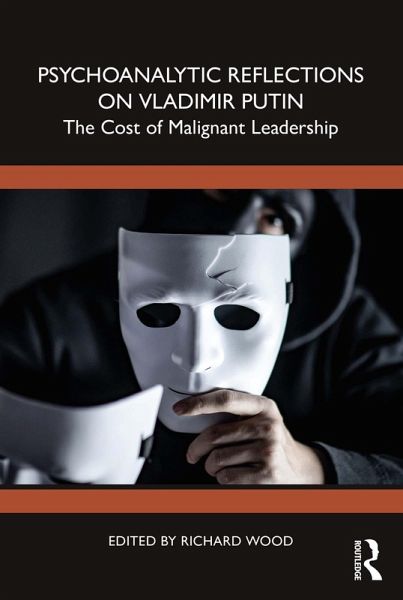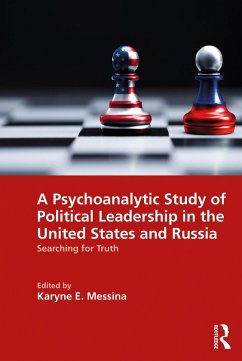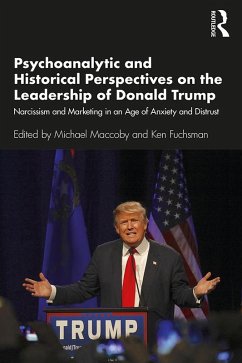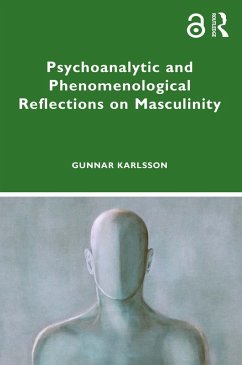'Wood's book gives us one of the most valuable analyses of Putin's personality and motives that I have read to date. Although authored by leading scholars, it is an easily understood book for the intelligent layperson. It is also terrifying. We often tend toward projecting some rationality onto dangerous autocrats or even denial of their severe intractable psychopathology. However, this book argues that there is "government by dangerous, strongmen figures driven by insatiable appetites, deeply compromised empathy, and a very destructive form of narcissistic pathology - that represents a clear and present danger the world must soon find a way to contend with if human survival is to be protected... that it is a danger that is growing, as
witness the rise in autocracies around the world, and a danger that history tells us has resulted in unimaginable human suffering and ecological damage." I want influential government officials to read this book, not only to understand Putin, but to understand and never underestimate the malignant autocrat that is ready to destroy all that is good in society. Wood's book should be taken as a very serious warning.'
Robert M. Gordon, PhD ABPP,
licensed Psychologist, Diplomate of Clinical Psychology, Diplomate of Psychoanalysis, Governing Council, American Psychological Association
'The contributions rendered in this book provide invaluable insight, enlightened perspectives and deep understanding of the etiology, manifestation and psychodynamics of the toxic strongman leader who has historically rendered, and is currently inflicting incalculable harm, if not also annihilation, upon his fellow human beings. There is equally penetrating attention given to those he has seduced into toxic followership. There is much to learn and take away from each of these erudite authors' offerings. It is a wake up call. The geopolitical landscape is changing and the threat that such leaders present to our way of life is of ever increasing magnitude. It must be clearly defined, well understood and immediately countered, not only by our political leaders, military chiefs, intelligence agencies and academics, but by an engaged citizenry - that is, all of us.'
Tim Gilmore,
Psychologist, Gilmore Associates'This is a book about the frightening world created by Vladimir Putin. It includes attempts by the author Richard Wood and his fellow psychoanalyst Brent Willock to understand Putin's mind, its development, and how that development has contributed to the behaviour that has come to frighten the world.
Willock draws attention to the impact of adverse childhood experiences on personality development and as the root cause of most social, economic, and mental health issues, including violence. He characterizes Putin's psychopathology as arising from a Kleinian paranoid schizoid perspective preceding the capacity for concern. He describes the frighteningly empty life of a schizoid personality, covering the lost heart of the self with psychopathic armour. Putin and other totalitarians provide themselves with an illusory sense of power, safety, independence, and esteem.
The possibility that Putin was born illegitimately to a woman other than the mother, described in his autobiography and noted by Willock, is an interesting piece of information since, if true, it offers a potentially altered view of his early development and possible evidence of a serious attachment disorder. Attachment pathology has shown individuals to develop either intense need for relatedness (anaclitic pathology) or narcissistic and antisocial behaviour (introjective pathology: Blass et al. 1998).
Three of the chapters in the book do not address Putin's psychopathology directly. Coline Covington, a training analyst and political philosopher, addresses the reasons for Putin's invasion of Ukraine. In a delightful chapter she writes of Putin's perception of a Eurasian Russia pitted against all Western democracies, seen as enemies, bent on destroying Russia, and as a threat to Putin's defensive need for total control of others. She paints a picture of a dangerous man who should not be dismissed as a bluffer.
Ian Hughes writes of the pathologies of the historical developments of modernity. This excellent article outlines how science and knowledge and the seventeenth century industrial revolution changed 2,000 years of struggling to survive for 85% of the world's population into better lives. Unfortunately, this still leaves 15% of the population starving and barely surviving.
The benefits of new knowledge and better standards of living have led to democracies, the abolition of slavery, and greater individual freedoms. Hughes also addresses the factors that oppose democracy, namely the rise of dictatorships with accompanying kleptocracy, hyper masculinity, debasement of women, loss of individual freedoms, and the inability to express personal feelings and ideas, all of which are features of Putin's Russia.
James Merikangas is a neuroscientist who offers possible biological explanations for Putin's psychopathy. The author describes the effect of the Treaty of Versailles on German society and their embrace of Hitler and his atrocities. He also addresses the atrocities conducted by the allies in retaliation. He suggests that we have moved from the age of "mutually assured destruction" to "nuclear blackmail" in Putin's invasion of Ukraine. Merikangas hopes that a scientific understanding of the brain will meld neurobiology with psychology and shape child development and education. In his view the study of figures like Napoleon, Stalin, Hitler, and Putin remains important if we are to survive the nuclear age.
Wood believes that malignant narcissism is a unitary diagnosis that can be conceived as a subclass of psychopathy. His comprehensive description of the condition derives from a childhood in the care of a malignant narcissist father and his subsequent professional experience of psychodynamic psychotherapy with narcissistic patients. Both add to the credibility of Wood's formulation. In the case of Putin, while questions might be raised about the merits of diagnosis from a distance, there is so much verified information about the behaviour of this political leader that conclusions can be drawn. The evidence of complete lack of empathy, ruthless destruction of opponents, and the absence of real friendships instructs us about potential future behaviour. A book such as this goes beyond professional interest. In the context of the ongoing war in Ukraine it will provide those who hope to end war and restore peace useful information about what they can and likely cannot expect from Putin as they attempt to negotiate with him.
For mental health professionals, the introductory and closing chapters of the book describe a psychodynamic understanding of Putin's psychopathology and his development - development that exposed him to poverty and abuse, all dangers to a nascent self. By training in martial arts as a youth to adult membership in the KGB, Putin aimed to protect his sense of self. Others' independent selves are dangers to be eliminated.
This book will be appreciated by psychoanalysts, psychologists, and psychiatrists alike. The additional chapters will also appeal to political scientists, historians, and journalists and politicians, not to mention the general public.'
David Raymond Freebury,
Associate Professor of Psychiatry, University of Toronto
'Richard Wood's
Psychoanalytic Reflections on Vladimir Putin: The Cost of Malignant Leadership brings a vast array of psychological and psychoanalytical knowledge to the study of the Russian president. It's an extremely erudite, insightful, and well written study, providing the reader with many valuable perspectives, including by several additional thoughtful authors. I strongly recommend it to deepen your understanding of Putin and the West's relationship with him.'
Dr. Paul H. Elovitz,
Presidential Psychobiographer, Research Psychoanalyst, Editor In Chief of Clio's Psyche
, and Director of the Psychohistory Forum














